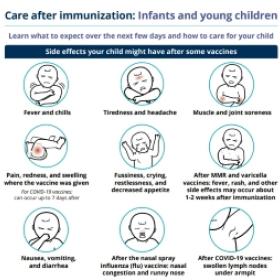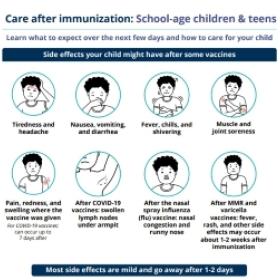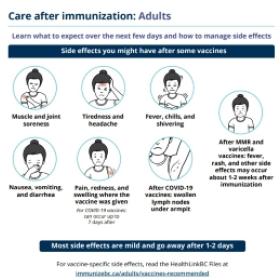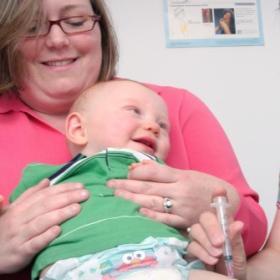Date last reviewed:
Monday, Mar 18, 2024
HealthLinkBC
Available in multiple languages.
Information
Meningococcal quadrivalent vaccine
The meningococcal quadrivalent vaccine is given to children in grade 9. It’s also recommended for people who are at high risk of meningococcal disease.
Disease it protects against
The meningococcal quadrivalent vaccine protects against:
- Infection from 4 types of meningococcal bacteria: types A, C, Y and W.
Although rare, it can cause:
- Meningitis, an infection of the lining that covers the brain.
- Septicemia, an infection of the blood.
These are serious and life-threatening infections. Learn more about meningococcal infection.
Fact
Did you know?
Teens 15 and older are at higher risk of getting meningococcal disease.
Who should get the vaccine
| Age | Schedule |
|---|---|
| Infants & young children |
|
| School-age children & teens |
|
| Adults |
|
People who are not eligible for the free vaccine but want to be protected against meningococcal disease can purchase the vaccine at most pharmacies and travel clinics.
How well it works
The protection of the meningococcal quadrivalent vaccine is around 80-85%. Protection wanes over time.
When you or your child gets immunized, you help protect others as well. People who are immunized are much less likely to catch a preventable disease and spread it to others.
Safety
Vaccine safety is a top priority in Canada. Every vaccine must be shown to be safe and effective before it is approved for use in Canada. After approval, the safety of vaccines is continuously monitored. Learn more about vaccine safety.
Fact
Vaccines are very safe.
Getting the vaccine is much safer than getting meningococcal disease.
Side effects
Many people have no side effects from vaccines. For those that do, they are usually mild and go away on their own within a few days. Serious side effects are very rare.
Side effects of the meningococcal quadrivalent can include:
-
Soreness, redness and swelling where the vaccine was given.
-
Headache, muscle soreness, fatigue, chills, fever and nausea.
It is important to stay in the clinic for 15 minutes after getting any vaccine because there is an extremely rare chance of a life-threatening allergic reaction called anaphylaxis. If anaphylaxis happens, you will be given medicine to treat the symptoms.
Let your immunization provider/clinic or health care provider know if you or your child have any serious or unexpected side effects after immunization.
How to manage side effects
For information on how to manage side effects, view the immunization aftercare sheets below.
Who should not get the vaccine
Speak with your health care provider if you or your child have had a life-threatening reaction to a previous dose of any meningococcal vaccine or any part of the meningococcal quadrivalent conjugate vaccine.
There is no need to delay getting immunized because of a cold or other mild illness. However, if you have concerns, speak to your health care provider.
Meningococcal quick facts
- What it is
-
Meningococcal infection is caused by bacteria. Meningococcal infection due to types A, C, Y and W is very rare in BC. Although rare, it can cause serious and life-threatening infections including meningitis, an infection of the lining that covers the brain, and septicemia, an infection of the blood.
- How it spreads
-
Meningococcal infection is spread from person to person by coughing, sneezing, or close face-to-face contact. It can also be spread through saliva. Babies and young children can become sick through sharing soothers, bottles or toys used by other children. Older children and adults can become sick through activities such as kissing or sharing food, drinks, cigarettes, lipstick, water bottles, mouthguards used for sports, or mouthpieces of musical instruments.
- Symptoms
-
Symptoms of meningococcal infection occur suddenly and can include:
- Fever.
- Intense headache.
- Nausea and often vomiting.
- Bulging fontanelle (part of an infant's skull).
- Stiff neck; stiff back in older children.
- Pinpoint rash.
- Risks
-
For every 100 people who get sick, up to 15 will die, even if they receive treatment. Permanent complications of infection include brain damage, deafness and loss of limbs.






